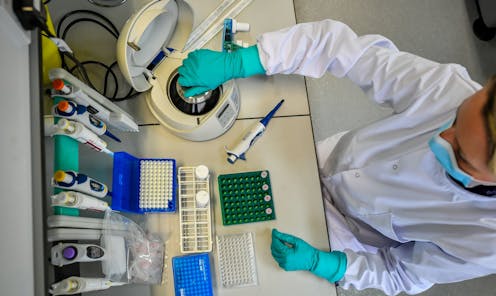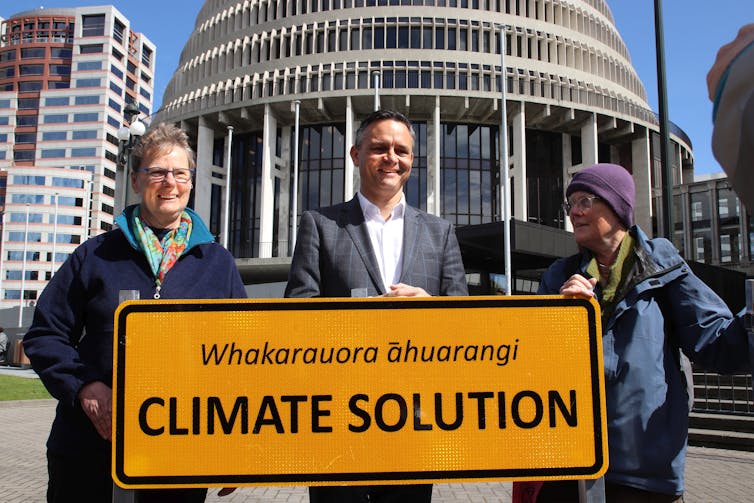Source: The Conversation (Au and NZ) – By Nicola Gaston, Co-Director of the MacDiarmid Institute for Advanced Materials and Nanotechnology, University of Auckland

Ben Birchall/PA Images via Getty Images
New Zealand’s government has been praised for listening to scientists as it continues to pursue its COVID-19 elimination strategy. But it’s difficult to find any signs of significant investment in science in the recent budget — or in fact previous budgets.
It was with a sense of déjà vu I scrolled through the tables listing expenditure. Surely, with all the challenges we know we need science to address, nothing is business as usual in 2021.
Research and innovation require continual maintenance and growth. This government has a 10-year target to increase research and development funding to 2% of GDP (the OECD average is 2.4%). But this year’s budget cuts or flat-lines research funds, at best.
The Endeavour Fund, a significant funding mechanism for many of my colleagues in the natural sciences and engineering, and the Health Research Fund (part of which goes to funding Health Research Council grants) both have appropriations for 2021-2022 in the order of 10% less than the previous year.
The Marsden Fund, New Zealand’s major fund for fundamental research and for the humanities, hasn’t decreased. But a flat line in funding is an effective cut.
The stipend I was paid as a PhD student in 2003 would be NZ$40,000, tax-free, in today’s dollars, but very few PhD candidates get even three-quarters of that amount these days.
These numbers matter, but they aren’t particularly transparent. I have been assured the actual dollars available in Endeavour and Health Research Council grants this year will be the same as last year. The Endeavour Fund is calculated at a fixed amount of new funding per year, but grants are awarded for timeframes that vary, so the $200 million allocation varies year on year as contracts end.
Last year, health research investment included COVID-19 specific funds, separate from HRC grants, and these are simply not being continued. Whether this amounts to an actual cut is a moot point. A productive research system is not just a nice-to-have, and it is dangerous to take it for granted.
Research inputs versus outputs
Perhaps we should celebrate and support government funding for the implementation of science outcomes, every bit as much as we welcome funding we need to do our research.
One of the most obvious places to look is the suite of policies related to climate change. There is a $300 million top-up for Green Investment Finance to accelerate investment in low-carbon technologies, $67 million to decarbonise the public sector, and nearly $20 million to support the policy response to the Climate Change Commission’s final advice package, to be tabled in parliament next week.

Lynn Grieveson/Newsroom via Getty Images
Climate change minister James Shaw suggested that once allocations for rail, warmer homes and research to reduce agricultural greenhouse gases are taken into account, this year’s budget adds up to $2.3 billion for climate policy.
As massive as this sounds, addressing climate change requires transformative policy and initiatives to catalyse action. This is not yet quite that.
But on the whole, this is a budget that looks to implement policy based on research advice. We should welcome the increase in benefits following advice of the Welfare Expert Advisory Group. As with climate change initiatives, this may not yet go far enough, but the direction of change is good.
Where funding goes matters
The means of funding, and the behavioural change it can enable, are just as important as the amount. Who gets funded, and what does it support them to do?
This is particularly important in the context of climate change, where we need to encourage behavioural change. But it is an equally important lens through which to examine research funding itself.
My biggest disappointment in this budget is that there is no provision for the continuation of the Science Whitinga fellowships, set up as a response to the impact of COVID-19 on early-career researchers. This is despite the absolute need and considerable evidence within the sector for the value of these fellowship schemes.
This scheme deserves new money, and I would have liked to see it prioritised over other forms of current expenditure.
I’m happy to acknowledge some early career research roles will always be funded within the sector. But it is vital, in the highly hierarchical academic workplace, to have mechanisms to rebalance the distribution of power and acknowledge the innovation emerging researchers contribute — especially so, when they are not yet committed to academic careers but could translate their work into start-ups, industry and work with communities.
Research is a means of creating positive change. New Zealand needs more money for research, but where that money goes and the change it creates matter even more.
![]()
Nicola Gaston receives funding from the Tertiary Education Commission, as Co-Director of the MacDiarmid Institute for Advanced Materials and Nanotechnology.
– ref. New Zealand relies on scientific research for good policy. It’s a pity the budget didn’t reflect this – https://theconversation.com/new-zealand-relies-on-scientific-research-for-good-policy-its-a-pity-the-budget-didnt-reflect-this-161340




